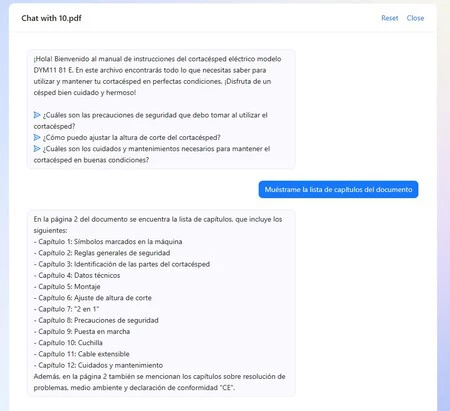At times, it’s nice to have time to quietly read a book, enjoying each page. In others, you need to have some specific information as soon as possible… so much so that you would like not to have to review it, but to be able to ask the corresponding data directly to the book.
You imagine? Being able to ask the book directly to tell you on which page of a novel that character appears for the first time, or to summarize an essay, or make a list of its most relevant theses?
Well, now it is possible to do it, thanks to the work and grace of ChatGPT and its recently launched API. Well it’s true You won’t be able to ask the book directly… but you can load the corresponding PDF file (no MOBI or EPUB, sorry) in the newly released ChatPDF tool for her to ‘read’ it for you.
We can load the PDF from our computer, but also from a URL. In fact, the web even offers us an integrated search engine with which we can find the document that interests us without leaving the web:
As it says on its website:
“With ChatPDF, your documents become smart! Simply talk to your PDF file as if it were a human with a perfect understanding of the content. […] It works by parsing the PDF file to create a semantic index, and then presents the relevant paragraphs to ChatGPT.”

We have started talking about essays and novels, but no one escapes that the greatest utility of ChatPDF comes from the hand of legal documents, academic articles and technical manualswho tend to have the annoying habit of being more cumbersome to read the more important their content is.
Of course, the web also warns us that “ChatPDF still can’t understand images in PDF files” (obviously, since ChatGPT can’t for now either) and that “you may have difficulties with questions that require understanding more than a few paragraphs at a time.” Same time”. In addition, Relevant data for those who handle sensitive documents: “data is stored in secure cloud storage and deleted after 7 days.”
ZAO, the Chinese MOBILE APP that through DEEPFAKE turns you into DICAPRIO in SECONDS
we have tried it
Given that right now, as the ChatPDF website warns, for now the documents that we upload to the tool are limited to 50 pages Due to the high demand, when testing the tool we have decided to use ‘The Cathedral and the Bazaar’, by Eric S. Raymond, programmer and famous pro-free software activist, and whose written work is also free distribution. I had a 20-page copy of it on my hard drive, so it was perfect.
First of all, once loaded, the tool automatically offers us a summary of the text, as well as (in the image and likeness of the Bing chatbot) three suggested questions What we might be interested in doing about the document. We can select one of them or ask our own questions:

When it comes to asking our own questions, the results have been mixed. I mean, generally good.but it has not been able to show us a list of chapters as an index (everything suggests that in this case it is a problem of the semantic structure of the PDF document, not of ChatPDF), and when mentioning in which pages it was mentioned Netscape, has ‘hallucinated’ and he has quoted us a non-existent page 137:

In any case, don’t worry, because we have tried a second document (a lawnmower manual available online) and there if it has been able to recognize and display the list of chapters without major problem:

Image | Based on an original by Sem-ming Lee on Flickr


